#beginner language
Explore tagged Tumblr posts
Text
Critically Endangered Language Introduction:
Ainu Language
アイヌ・イタㇰ

Photos provided by AMNH
Some information about the Ainu language:
It’s critically endangered, meaning there are very few native speakers left, who are also elderly, and young people are not picking up the language. Ainu doesn’t have its own original writing system, so Latin script and a modified version of Katakana are used. For this post I will be using both Latin and Katakana script. You can read more about the Ainu language and people on Wikipedia, here and here.
Example Words & Phrases ↓
Provided by Wikitravel at this link
Irankarapte
イランカラㇷ゚テ
Hello/Nice to meet you
E=iwanke ya?
エイワンケ ヤ?
How are you?
Ku=iwanke, iyairaykere
クイワンケ、イライライケレ
Fine, thank you
E=re hemanta ya?
エレ ヘマンテ ヤ?
What is your name?
K=ani anakne ______ ku=ne
カニ アナㇰネ _____ クネ
My name is ______ .
E
エ
Yes
Somo
ソモ
No
Amerika-itak
アメリカイタㇰ
English Language (literally: “America Language”)
Kunne
クンネ
Black
Retar
レタㇻ
White
Katuwa
カツ゚ワ
Grey
toy-haru
トィハル
(fresh) vegetables
nikaop
ニカオㇷ゚
(fresh) fruit

Please correct me if I made a mistake
#endangered languages#endangered language#critically endangered#critically endangered language#critically endangered languages#ainu#ainu language#dying language#endangered culture#Critically Endangered Language Introduction#Language Introduction#language preservation#historic preservation#ainu culture#ainu people#language learning#beginner language#beginner ainu
57 notes
·
View notes
Text
fic wherein some of the TOS crew is being questioned by an entity who seems to think that the best way to take (and keep) control of the enterprise is to ensure Kirk's cooperation by figuring out which girl he's in love with and using her as collateral. The entity has got a truth compulsion thing on Kirk and keeps asking him things, forcing Kirk to answer, but... well.
ENTITY: You're in love with a woman. Who is she?
KIRK: I'm not.
ENTITY: Sure you are. You're James T. Kirk. You're always in love with a woman. Fine, if you won't answer that, then who's the most beautiful woman on the Enterprise?
KIRK: There are many beautiful women in my crew. I don't know if I could pick a most beautiful, though. I don't think about that when we're working. I'm their captain; it would be inappropriate.
ENTITY: Give me a real answer! It's a simple question! Who's the most beautiful person on-
KIRK, INTERRUPTING: Spock.
ENTITY: ... what?
KIRK, BLUSHING: Uhm. isaidspock.
#the confused entity makes the mistake of asking why and a mortified kirk is compelled into a LONG explanation of spock's many appeals#uhura is in the corner eating popcorn as she watches poor kirk forced into waxing poetic about spock's cheekbones#chekov did not know that there were so many ways to compliment someone's eyes. he's taking notes.#o course the longest section isn't even about spock's physical appearance it's about his scientific curiosity (which kirk is enamored with)#beginner mistakes on the entity's part: never use gendered language if you aren't certain#extremely half baked fic ideas#free to a good home#star trek#tos#star trek tos#spirk#james t kirk#jim kirk#spock#fic ideas#this one is silly
153 notes
·
View notes
Note
at least as far as french goes, learning the genders of things is entirely memorization. and yes, learners of the language struggle with it.
in fact, if you're writing and want to convey that the person doesn't speak french too well, you have them misgender inanimate objects.
there's no rules to determine a thing's gender, not even vibes; in fact, the opposite is true: for native speakers, which gender a thing is will then color the vibes that they associate with that thing. this is why i will forever associate spiders with cunning and motherood.
and finally, i've saved the dumbest for last: in 2020, there was debate if COVID is male or female.
.
#???#these are genuinely such foreign concepts to me#my mom speaks a handful of heavily gendered languages including French and she didn't think it was too much of a fuss to figure out#but I don't#I speak Finnish English#some basic Swedish#and beginner Northern Sami#or at least used to I think I've forgotten most of the latter two if I'm being honest#but this Romance language stuff? my brain has never been conditioned for any of it#answered#anonymous#so which one was it?
243 notes
·
View notes
Text
Japanese Reading Resources for Absolute Beginners
A question I encounter often is "How much Japanese should I study before I can begin reading in Japanese?"
From my experience as a learner and reader myself and from managing a Japanese book club for other learners I can honestly say that you can start way earlier than you probably think!
There are many resources that only require knowing hiragana. Those texts usually teach vocabulary through pictures and only use basic grammar.
Some are even simpler than that: The Japan Foundation's Hiragana Books are great for those, who are still remembering hiragana characters. Every short book introduces only 1-2 new characters, so it's a great reading exercise for those who've just started.

The free graded reader 「どうぞ、どうも」 by the NPO Tagengo Tadoku only uses the words 「どうぞ」 and 「どうも」 to write an entire story. Again, this makes for a great exercise in reading hiragana and understanding context. Another "level 0" recommendation by the same NPO would definitely be 「しろい?くろい?」. This book uses the full range of hiragana characters but the grammar is simple and all used vocabulary is illustrated.
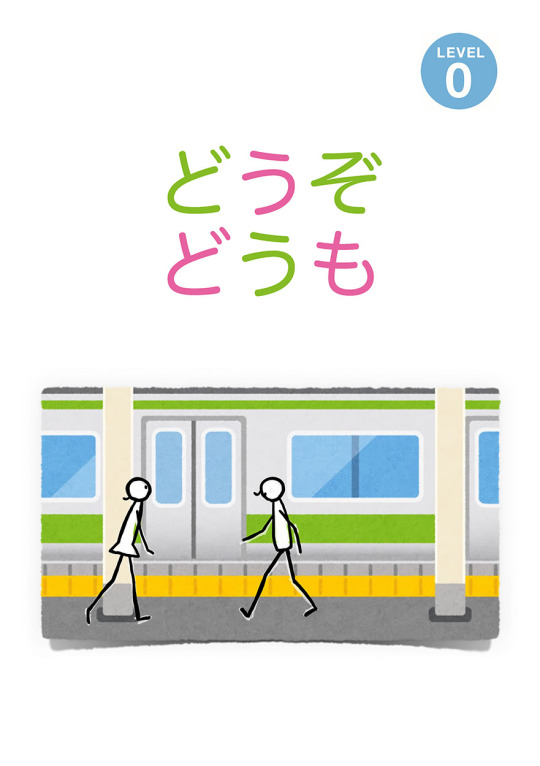

Another site with great resources for absolute beginners is Nihongo Tadoku Dōjō. If you have memorized both hiragana and katakana and know how the particles を and で work you will be able to read this text about stationary (ぶんぼうぐ) and understand everything by looking at the pictures!
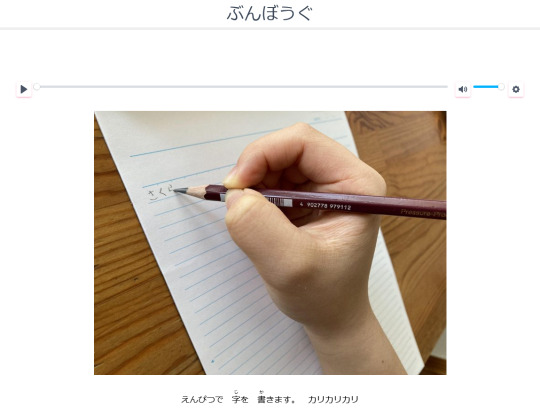
The resources linked so far can all be accessed completely free on the linked websites. If you have the money to spare, please also have a look at the box 「スタート」 from the series reberubetsu nihongo tadoku raiburarī published by the NPO Tagengo Tadoku and ASK (affiliate link). This box includes 8 little books in very simple Japanese.

All these texts for absolute beginners will get you started reading in Japanese with very little knowledge of characters and vocabulary.
Reading in Japanese is a skill that requires practice. But once you get used to it, it can be such a valuable tool to reinforce new vocabulary and grammar. So please don't wait until you're "ready" before you start reading - start early at your own level!
#my book reviews#reading in japanese#study japanese#learning japanese#日本語#japanese books#やさしい日本語#free graded readers#free tadoku graded readers#nihongo tadoku dōjō#absolute beginner level#japanese langblr#japanese language#japanese reading comprehension#japanese free reading resources#japanese reading resources
1K notes
·
View notes
Text



español resources
- better than duolingo lesson platform; exam style questions - tongue twisters in spanish - best spanish homepage (it has everything) - spanish tutors - quite costly - translation of 'silly phrases' - basic spanish 1 - basic spanish 2 - basic spanish 3 - coffee break spanish (youtube) -foreign service institute basic spanish - foreign service institute programmatic spanish -foreign service institute headstart for spain - foreign service institute headstart for latin america
#elonomh#elonomhblog#student#that girl#student life#academia#chaotic academia#becoming that girl#productivity#study blog#español#españa#espanol#bilingual#multilingual#learning languages#vocabulary#language learning#target language#spanish#beginner spanish#spanish ab#international baccalaureate#ib program
207 notes
·
View notes
Text
From the just hold my hand scenes that (probably) won't be written
Ice can't talk, he hasn't been able to for a while, not long after the diagnosis even, but since his last surgery, he knows he will never be able to again.
He and Mav learned sign language as soon as this became a possibility — they attended lessons together, sometimes online, and they practiced with each other, until they became fluent enough to communicate daily using sign. It became faster than Ice writing whatever he wanted to say and so it became primarily how they talk if it's just the two of them — by the time Bradley enters their life again and brings in a whole new husband and four (and counting) kids into it, they use sign language every day casually.
Bradley and Jake's middle daughter, Ronnie — Ice is her favorite, has been since the day they've met. Mostly due to his calm and soothing demeanor and just the aura of safety he has to him, but also because she's a quiet kid who doesn't talk much — she has a bit of a speech development problem that isn't too worrying at her age but has to have an eye kept on it — and often gets buried under the hyperactivity of her older sisters who talk a mile a minute or under her baby brother who craves attention and often gets it because he's cute as a button when he's clingy. But Ice always took the time to pay attention to her even if she was quiet or if she was not doing anything, even if it was just sitting next to her or holding her or basically looking at her expecting her to show him what she was doing or what she liked. People outside of her basic family (her parents and her memaw) rarely get her as much as he does.
So she's maybe a little clingy about Ice.
And you know, when it kind of settles that Mav and Ice are going to be in their life, Bradley promised himself he'd at least try to learn sign. He's terrible at it, he's always been not that good at languages and despite having the finger flexibility that a lot of learners struggle with, he just doesn't have the muscle memory that lets him have a smooth learning.
When Ronnie sees him practicing at home and asks why he looks like grandpa Mav when he talks to grandpa Ice and he explains that it's how Ice speaks (which Ronnie never thought about because she's a kid and she thought grandpa Mav could just understand Ice so well without speaking out loud because he loves him so much, the same way her parents did with her), she gets obsessed.
Next time Bradley takes the kids for some playtime with their grandpas (while Jake and Bradley have some me-time together...), Ronnie gets all shy when Bradley says the well-known phrase of, "Go say hi to your grandpa," and she signs to Ice.
It's just a little clumsy "Hello, grandpa," the simple wave of a hand looks a bit too much like a salute and maybe she adds a third tiny arch as the sign for grandpa finishes but Ice gets it and it gets everyone — especially Ice — a little teary-eyed as well.
[Also, sign language often has the same kind of insider linguistic slang families have when using spoken languages (you know, your sister once calls the terrace door windwoor when she's five and your whole family still calls it that even though she has kids of her own and a corpo job now... this but with hand signs) and I love the idea of Ice encouraging her to make those mistakes and then having them become only their inside vocabulary that no one else gets]
#hangster#icemav#icemav (kinda) kid having kids of his own is just melting my heart and brain#not even a beginner speaker of asl I'm but yeah#there's just something about sign language that gets me all *waves hand*#just hold my hand tag
214 notes
·
View notes
Text


#spanish#spanish language#spanish phrases#spanish food#spanish for beginners#learn spanish#quesadillas#hispanics#latinos#latina#creativity#spanish langblr#langblr#languages#learning languages#language#language learning#writing#creative writing#writers on tumblr#writers#writeblr#writerscommunity#writing community#writer#writers of tumblr
89 notes
·
View notes
Text
One-Page Masterlist
안녕하세요! Hey everyone! I recently got an ask about my old masterlist, which is the same as my broken-down masterlist except it has all of my lessons on one page, rather than on multiple separate posts. Some may find this expanded version easier to navigate, so I’ll keep this up for y’all! My broken-up masterlist, of course, will still be available for those who find that more helpful :)
Hangul Lessons
Consonants
Vowels
Writing/Reading Korean Syllables
Some 받침 Rules
Diphthongs
Stroke Order
Some More 받침 Rules
Irregular Verbs
The Basics
Common Phrases
Numbers
Sino-Korean vs. Native Korean Numbers (Instagram Post)
Sentence Structure and Particles
Present-Tense Conjugations and Formal Language
Adjectives
Questions
Honorifics and Casual Language
Beginner
Negative Sentences
잘 and 못
Past Tense
Future Tense (-�� / 을 것이다)
-ㄹ / 을 까요? (Shall we…? / I wonder…?)
-(으)세요 (Giving Commands / Asking Questions)
Telling Time
-고 싶다 (I want to…)
How to Say “And”
-지만 (However)
아/어/여서 (So…)
Negative Commands
Spacing (띄어쓰기)
Adverbs
ㅂ Irregular
Comparatives and Superlatives
난, 날, & 내가
Upper-Beginner
-(으)면 (If…)
아/어/여도 (Even though…/Even if…)
(으)면 되다 / 아/어/여도 되다 (I can…/You may…)
-아/어도 되다: Asking for and Giving Permission (Instagram post)
-(으)면 되다 & -(으)면 안 되다 (Instagram post)
아/어/여야 되다 and 아/어/여야 하다(Have to / Should)
Present Progressive (-고 있다)
How to Say “Or”
-아/어/여하다
All About 중
How to Use -(으)로
Before & After
-ㄴ/은 채로
Intermediate
Describing Nouns with Verbs (-는 것)
Describing Nouns with Verbs - Past & Future Tense (-ㄴ/은 / -ㄹ/을 것)
Nominalization
것 같다 (I think… / It seems…)
-러 가다 / -러 오다
-(으)려고 (In order to…)
-기로 하다 (to Decide to do Smth)
척하다 (To Pretend)
-게 되다
-군요 / -구나
아/어/여 보다 (to try…)
-은/ㄴ 적 있다 / 없다 (I have / have not)
-ㄹ/을 게요 (Future Tense)
겠다
-ㄹ/을 수 있다/없다 (I can / cannot)
-ㄹ/을 때 (When…)
-ㄴ/는다면 (If)
-(으)면서 and -(으)며
-(으)니까 (Because / So)
-아/어/여주다
-(ㄴ/는)다 (Narrative Form)
Quoting
Let’s…
Quoting continued
(으)ㄹ래요? (Wanna…?)
-죠
-대로
More Quoting - 대 & 래
잘하다 & 못하다 vs. 잘 하다 & 못 하다
-아/어 가지고
-(으)려면
-는 ��에 & -는 길이다
-(으)면 vs. -ㄴ/는다면 (Instagram Post)
-았/었을 것이다
-느라고
-는 데(에)
-ㄹ/을 뻔하다
Upper-Intermediate
-ㄴ/는데
-(으)ㄴ/는지 (Whether or not)
-(이)라는…
All About 아무리
-잖아요
Expressing Surprise
-시 (Honorific)
Making Comparisons
-아/어/여지다
I might…
So that…/To the point where…
Causative Verbs
시키다
Passive Verbs (part 1)
Passive Verbs (part 2)
-ㄴ/은가 보다 & -나 보다 (I guess…)
-ㄹ/을수록
Other Meanings of 싶다
-자마자 & -는 대로(As soon as…)
-긴 하다
-치고
-김에
차라리 (Rather)
-(으)ㅁ Nominalization
-기는 무슨 & -기는 개뿔
-고 보니까
-듯(이)
버리다
-(으)면 좋겠다 & -(으)면 하다
-길 바라다
Advanced
-거든(요)
-줄 알다/모르다
-ㄹ/을 테니까 and -ㄹ/을 텐데
-았/었던
아니라 and 대신에
-ㄹ/을 리가 없다
편이다, 별로, and More
-지 그렇다 (Why don’t you…?)
-ㄹ/을 걸
-ㄹ/을 까 보다
-다면서요
-다니 part 1
-다니 part 2
뜻이다 & 말이다
-다가
-더라고(요)
-더니
Some colloquialisms: 아니시에이팅 and 뭐 이렇게
-(으)ㅁ Sentence Ending
-다 보니까
What does 따위 mean?
-ㄴ/는데도
Korean Idioms
Vocabulary
Must-Know People
Must-Know Places
Must-Know Things
Must-Know Verbs
Must-Know Adjectives
Countries
Months, Days of the Week, and More
Clothing (옷)
School (학교)
Autumn (가을)
Autumn (w/Pictures!)
More Questions
House / Apartment (집 / 아파트)
Emotions / Feelings ( 감정)
Animals (동물)
Loan / Konglish Words
Food and Drink (먹을 것과 마실 것)
Parts of the Body (몸)
Counters
Modes of Transportation (교통 수단)
Colors (색깔)
Colors (with Pictures!)
Weather (날씨)
Winter (겨울)
Music & Instruments (음악과 악기)
Baking Gingerbread Cookies
Emergency (비상)
Hygiene & Bathroom (위생 & 화장실)
Indefinite Pronouns
Work / Office (일 / 사무실)
Spring (봄)
Coronavirus Prevention (코로나바이러스 방역)
How to Wash Your Hands (손을 씻기)
Time (시간)
Korean Cuisine (한식)
Summer (여름)
Summer (여름) w/Pictures!
Graduation (졸업)
Identity (독자성)
Korean Text Slang
Similar Words
Makeup w/Pictures! (화장품)
Family (with Pictures!)
Pronouns
How to Say “Still” and “Already” in Korean
Tastes & Textures (맛과 질감)
K-Pop Audition
K-Pop Fandom Terminology
Different Ways to Say “Change”
Flower Names
What Does 원래 Mean?
What does 오히려 Mean?
College
Hanja Lessons
최
수
악
식
급
동
부 & 불
애
출
퇴
예
음
중
학
습
연
생
대
입
인
문
감
과
원
특
만
후
무
Charts
Present, Past, and Future Tense
Question Words
잘 vs. 못 and Negative Conjugations
Future Tenses
-았/었던 vs. -던 (at end of lesson)
Particles
Some 받침 Rules
Gifving Commands
Conjunctions and -아/어/여서 vs. -(으)니까
-(으)면 vs. -다/라면 and Different Ways to Say “And”
How to Say “Or” (at end of lesson)
Telling Time (at end of lesson)
Comparatives and Superlatives
잘하다 & 못하다 vs. 잘 하다 & 못 하다 (at end of lesson)
Comparing 잘하다/못하다, 잘 하다/못 하다, & 수 있다/수 없다
Irregular Verbs
Pop Quizzes
Level 1
K-Pop Breakdowns
TXT - “Cat & Dog”
Twice - “Feel Special”
Enhypen - “Fever”
2NE1 - “Go Away”
Lee Hi - “Only”
“기억을 걷는 시간 (Time Spent Walking Through Memories)”
KCM - “An Old Love Story (흑백사진)”
Taeyeon - “Can’t Control Myself”
Epik High - “Lost One”
Colde - “A Song Nobody Knows”
IU - “My Sea”
Enhypen - “Polaroid Love”
유라 (youra) - “하양 (RAL 9002)″
BTS - “Ddaeng”
Stray Kids - “For You”
Woozie - “어떤 미래 (What Kind of Future)
TXT - “Eternally”
LOONA - “Heart Attack”
Stray Kids - “Muddy Water”
LOONA - “Girl Front”
Pentagon - “Daisy”
BTS - “Sea”
Semester in SK
Nami Island (남이섬)
Things to Buy at Daiso
Shopping Phrases
Ordering Coffee
Signs in Korea
Ordering at a Restaurant
Riding the Seoul Subway
Things at the 편의점
Korean Curse Words
Etiquette in South Korea
Drinking Culture
Hanja in Real Life
Holidays in South Korea
Korean Cuisine
Concert Ticketing in South Korea
K-pop Comebacks in Korea
Summer in South Korea
What I Learned
#korean#korean language#hangul#korean grammar#korean vocab#korean vocabulary#learn korean#learning korean#langblr#Korean langblr#masterlist#apok#apopofkorean#study korean#studying korean#kpop#kpop lyrics#basic korean#beginner korean#intermediate korean#advanced korean#hanja#한국어#한글#한자#한국어 공부하���#한국어 배우기#한국어 문법#한국어 어휘#초급 한국어
2K notes
·
View notes
Text
Russian Vocabulary: Around the House
Russian — English
• Дом — house
• Комната — room
• Гараж — garage
• Лестница — stairs
• Диван — couch
• Лампа — lamp
• Телевизор — television
• Ванна — bathtub
• Душ — shower
• Раковина — sink
• Мыло — soap
• Туалет — toilet
• Чашка — cup
• Вилка — fork
• Нож — knife
• Микроволновка — microwave
• Тарелка — plate
• Холодильник — refrigerator
• Ложка — spoon
• Кровать — bed
• Одеяло — blanket
• Подушка — pillow
• Стул — chair
• Патио — patio
• Бассейн — pool
• Двор — yard
• Чердак — attic
• Подвал — basement
• Потолок — ceiling
• Стена — wall
• Дверь — door
• Пол — floor
• Крыша — roof
• Окно — window
#langblr#langblog#language#follow#language nerd#russian langblr#russian lang#russian language#followtrain#follow for follow#foreign languages#language learning#languages#russian resources#russian studyblr#russian#russia#vocabulary#Russian vocabulary#vocab list#vocab#Russian vocab#like#notes#translation#translator#dictionary#follow me#house vocab#beginner
68 notes
·
View notes
Text
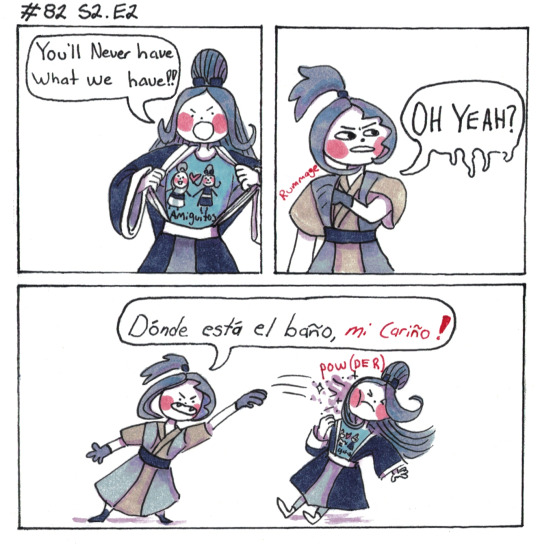
Los Chicos Peleandoooooo
[First] Prev <–-> Next
#poorly drawn mdzs#mdzs#song lan#xue yang#I know it makes jokes less funny if you explain them but I feel like I gotta for this one:#xue yang’s Spanish here is playing on the fact he’s a beginner (using a commonly taught phrase)#combined with the fact that he’s clearly taking what he’s heard Xiao Xingchen use.#of course XY would want to know how to cuss someone out in another language. Do you think XXC would teach him how? Nope.#XY would ask ‘How do I to someone I really hate them?’#and XXC would say ‘You tell them ‘Te Amo Mucho’ :•)’#As FAR as XY is concerned he knows *so* many swears. These words are just terms of endearment.#XXC would not swear or cuss anyone out but he *would* punctuate phrases with general terms of endearment.#More so directed towards A-Qing but Xue Yang has been proven to be a decent indirect learner.#That said he has also been shown to Not Quite Get The Nuances (consequences of observational learning).#Sadly he never had a good observational model for love or compassion B*(#Spanish speakers please oh god please correct me if I biffed something badly here. I can fix it.
761 notes
·
View notes
Text
Not studied Finnish yet? This is your sign!
Here are the absolute basics of the language in an even tighter package compared to my earlier posts. Maybe someone new will take interest in the language from these posts!

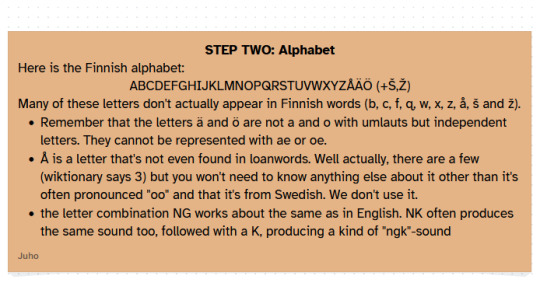
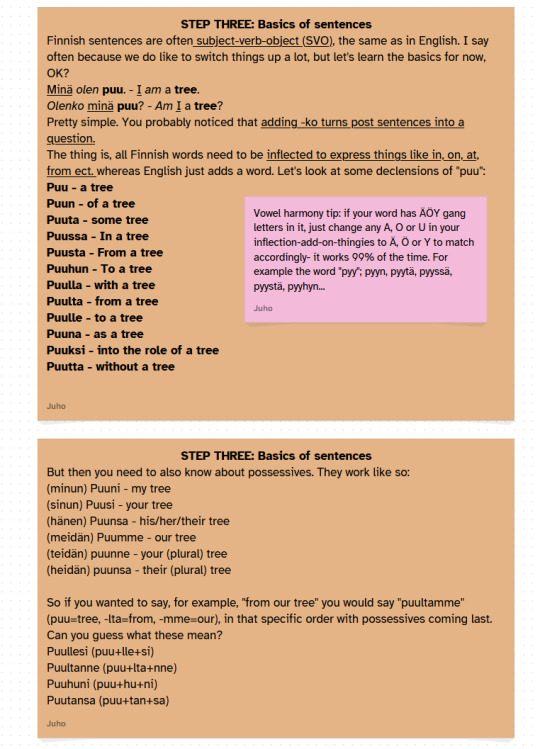
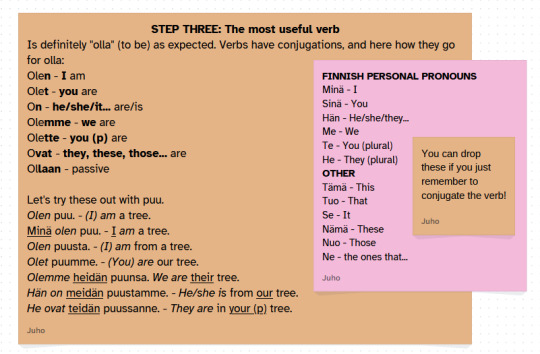
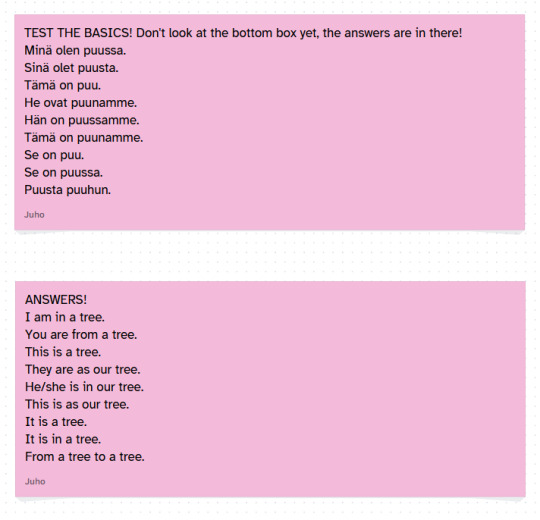
To my existing followers, are these kinds of posts good for you? Could my normal posts be in this format sometimes too?

#finnish#langblr#langblog#language#learning#finland#beginner finnish#suomi kieli#suomen kieli#finnish language#learning finnish#language learning#polyglot#languageblr#multilingual
427 notes
·
View notes
Text


"Let me see your face"
#i joined some chinese apps and when i tell you that im being fed Kingohger content#I mean I'm being FED#Those sites are a fcking FEAST even with the language barrier (curse you baby me for crying over chinese lessons)#so far they like some of the doodles I've put out and got some new moots bonding over HimeRita which is great#but fck i gotta learn Chinese if I wanna communicate better (speaking too bc I only know beginner Canto and 0 Mandarin)#kingohger#king ohger#ohsama sentai kingohger#rita kaniska#rita kanisuka#himeno ran#hymeno ran#himerita#hymerita#kingoh doodles
23 notes
·
View notes
Text
Crafting a Fantasy Language: 25 Writing Prompts for World-Builders and Storytellers

Creating a unique language for your fantasy world is one of the most exciting and immersive ways to bring depth and authenticity to your world-building. It can shape how your characters interact, define their culture, and influence their history and magic systems.
But where do you start?
Below are 25 writing prompts to help you build a prosperous, culturally embedded language that feels as alive as the world you create.
Root Words and Origins
Start by developing core root words. For example, words like “life,” “death,” or “magic” are central to the culture. How do these root words evolve into other terms? Are they tied to mythology or historical events?
Phonetic Rules
What does your language sound like? Decide on familiar sounds and patterns. Do certain phonetic combinations carry spiritual or cultural significance? For instance, soft sounds are for peace, and harsh sounds are for power.
Honorifics and Titles
Design a system for titles and respect. Is there a specific way to address elders, warriors, or magical beings? Do different regions or classes use distinct honorifics?
Grammar Rules
Create unique grammar rules. How does your language handle sentence structure, tense, or gender? Is time expressed differently, or does your language have an untranslatable concept?
Cultural Influence on Language
How does culture shape the language? Does it have specific words for rituals, nature, or emotions that don’t translate directly into our languages? How do spiritual beliefs influence everyday speech?
Language Evolution Over Time
Write a brief history of how the language evolved. Did it splinter into dialects or undergo drastic changes? How does the ancient version of the language differ from the modern one?
Idioms and Metaphors
Create idioms reflecting the culture’s beliefs. What do they say to describe someone wise, foolish, or lucky? How do natural elements like mountains or storms influence these expressions?
Magical Incantations
Develop a system of magical language. Are there special words or sounds that must be used for spell-casting? How does the culture perceive these words—sacred or dangerous?
Formal vs. Informal Speech
Establish formal and informal registers in your language. How do characters speak to authority figures versus friends? Is formal speech more flowery or simply more rigid?
Writing System
Does your language use runes, symbols, or an alphabet? Is writing reserved for the elite or magical classes? The activation of certain words might require inscribing them on stone or parchment.
Emotion in Language
Examine how the language conveys emotions. Does it have words for nuanced feelings, like a specific term for unrequited love or a parent’s pride?
Sound Symbolism
Consider how the sound of a word reflects its meaning. For example, long vowel sounds might be used for beauty or calm, while short, sharp sounds are reserved for urgency or anger.
Names and Naming Conventions
Create naming traditions. Are names passed down or chosen based on events or personality traits? Does a name hold magical power, shaping one’s destiny?
Dialect and Regional Variations
Imagine how different regions or social groups speak. Does one region speak in a formal tone while another uses a clipped, more casual dialect? How do these differences cause misunderstandings?
Proverbs and Wisdom
Develop proverbs or sayings that reflect cultural wisdom. What does the culture say about offering advice or warning against danger? How are these proverbs tied to religion or folklore?
Cursing and Insults
Craft curse words or insults. What offends people in this culture? Are insults based on personal bravery, family honor, or physical appearance?
Historical or Dead Language
Create a dead language that was once widely spoken but only used in rituals. How does it influence the current language? Is it studied by scholars or magicians?
Gestures and Body Language
Does the culture rely on body language alongside speech? What gestures complement or emphasize words? Are there specific hand movements or bows tied to certain phrases?
Language and Religion
Explore the relationship between language and religion. Are there sacred words only spoken by priests or during rituals? Does the language invoke gods or magical forces?
Borrowed Words
Create words the language has borrowed from neighboring cultures. How have they been adapted, and what tensions exist between the borrowing and original cultures?
Linguistic Taboo
Are there forbidden words or phrases? How is breaking this taboo viewed—does it bring misfortune or divine wrath? Are these taboos tied to ancient magic or politics?
Wordplay and Riddles
Develop a tradition of wordplay or riddles. How do these reflect cultural values? Is wordplay used for humor, or does it hold deeper, more philosophical meaning?
Poetry and Song
Write a poem or song in your fantasy language. How does the structure of the language shape its poetic forms? Are certain sounds or words reserved for religious or ceremonial songs?
Powerful Words
In some cultures, words are believed to hold power. Write a scene where a character uses a single word to summon magic or change someone’s fate. What makes this word so powerful?
Silent Communication
Create a silent form of communication—hand signs or gestures used for secrecy, combat, or ritual. Who uses it, and why was it developed? How does it interact with spoken language?

Building a fantasy language isn’t just about creating a cool set of sounds or words—it’s about breathing life into your world. Every phrase, idiom, and root word carries cultural, historical, and magical weight, giving depth to your world’s characters and lore. Use these prompts to develop a language that feels alive and connected to the people who speak it.
Have you crafted a unique language for your world? Reply and tell me about the most exciting aspect of your creation.
#writerscommunity#writeblr#writer community#writers on tumblr#queer writers#writerblr#writerscorner#writers#creative writers#writing advice#fantasy worldbuilding#fantasy language#langblr#my writing#writer stuff#writing inspiration#aspiring writer#beginner writer#being a writer#character writing#fantasy writer#creative writing#fantasy writing#fiction writing#how to write#life of a writer#novel writing#on writing#original writing#book writing
51 notes
·
View notes
Text
Self / Independent Learner's Guide to Language Learning From Zero
-a mini study plan I used this for Spanish, French and Italian, it is my favourite way of starting to learn. It won't teach you the langauge but if this is your first time, if you feel confused and don't know where to begin, this is for you! -this is kinda romance langauge based but might give you ideas if you are learning from a different family too -this is very notebook / writing based since i prefer learning that way Step 1: Preperation
First of all, ask yourself "do i already have some amount of immersion in this langauge?" As humans, we learn from immersion a lot. Songs, but especially visual media is incredibly heplful. I never studied japanese but after watching a few animes i picked up 5-10 random words. Passive vocabulary, being familiar to most common words will be your biggest friend. If the answer is no, before start studying ANYTHING do some immersion. e.g. I watched dix pour cent for French and learned arrêt which means stop because characters were shouting to each other all the time.
After making sure you have some immersion or if you already have some, PREPARE YOUR RESOURCES. Make a file in your computer, reblog tumblr posts, save links. Search for pdfs in google. (x language a1 pdf / x langauge a1 grammar book / x language a1 reading) Free PDF's and and useful websites. The more the merrier. Why? Because when you actually start learning you will slowly realise them half of them are not actually useful, too advance, too simple, not in your preffered style etc. You will en up using same handful amount of resources again and again but before that, you have to TRY EVERYTHING. You are unique and so will be your learning process.
Google x language A1 curriculum. (you can try adding "pdf" at the end of sentence as well) It "probably/ hopefully" exists. If you can't find that way, learn which offical exam is necessary (e.g. for French it's DELF/DALF, in english there is IELTS and so many more) If you are lucky, you can find a langauge teaching enstitute's curriculum and you can find in what order they teach things. This was very helpful for me because sometimes you don't know what to study next, or just want to visualise what do you need to learn, it is helpful. I printed one out and paste it to the back cover of my notebook. You won't need this one YET. I'll explain in a second. Keep reading.
Get a notebook. I don't prefer books while learning from zero because it will be filled with vocabulary you don't know. My pereference is no squares no lines empty ass notebook and colorful pens. I'm a person of shitty doodles. I love to draw and visualise things. It really helps my brain. In A1, your knowledge is absouletly zero and your brain is about the explode with realising GREAT MASS of knowledge you need to learn in order to be "fluent" . So keep things away from being "too much" if you want to avoid a burnout.
Set a timer. If you want to avoid burnout, the secret is always quit when you feel like you can go another round happily. Quit when you are dopamine high. If you study too much, next day you'll wake up tired, want to rest etc. and make it harder for you to create a habit. I did this mistake with French by studying 4-5 hours everyday for around 30 days. I completed my challenge, completly quit and then didn't come back for MONTHS.
You will be re-studying A LOT. Language learning is repetition. You will start by studying "the A1 curriculum". But, because this is your first time your focus will be on the vocabulary and general comprehension. You are trying to re-wire your brain, and learn a different way of thinking and living. It's not easy. It will take time. It will be painful at times. But it is 100% worth it.
After you finished studying your curriculum, you'll take a short break and then study the curriculum AGAIN. For a second time. Because you already know the basics, this time you will be able to focus more on the little things you weren't able to comprehend the last time. e.g. articles or whatever little frustaring thing your langauge has. Also focus more on basic prononciation and especially reading aloud. Find a realistic text-to-reader. Copy-paste a text. Listen and repeat.
Get a new Youtube and Instagram account dedicated to langauge study. How many good resources exists and where they are is really depens on which langauge you are learning. For english, youtube is better. For French, instagram is better. You have to see for yourself. If you get a seperate account for your langauge algorith will learn faster and you won't be distracted by other stuff. Short form engaging videos are the best for absolute beginners. Re-watch things and try to repeat them out loud. It's called shadowing and is your future best friend.
If you want to learn how to speak, you first need to how to write. If you can't write sentences without looking at google translate (or reverso) you won't be able to make up sentences in your head. If you want to learn how to write, your first need to learn how to read. You need to start in this order but also don't be perfectionist. Do it even if you do it wrong. They will be fixed eventually and won't stick. Record yourself speaking even if the text you are reading is 90% google translated. Why? Beacuse speaking will enhance your vocabulary in a way no other thing can and that's the core of reading. So this isn't a linear thing. It's actually a circle!
Step Two! Ok, Sadie, i got my notebooks and read through all the warnings where do i start? *First page: [] means written is target langauge
[x notebook] x= your target langauge
Add something cute and make you feel happy to open up the notebook. It can a drawing, a picture, anything. First page is your entrance to your new home. Make it welcoming.
*[My name is X. I am Y years old. I live in Z.] *Greetings. Main articles if there are any. Yes, no, please, thank you. *What is your name, what do you do for living, how are you, where are you from, how old are you, how many langauges do you speak, numbers from 0-100. If there are multiple way of saying these things and probably there are, just write one. You will eventually learn others. Baby steps. *write a basic ass text of two people having a conversation asking and answering these questions.
*the alphabet and how to pronounce the letters. basic letter combinations that change into a different sound. a youtube video about this 100% exists.
*personal pronouns and if there is a "am/is/are" verb the conjugation of it. (in spanish there is two unfortunately) *artciles and basic noun endings. a couple exemples of nouns in x form but takes y article. *first 5 most common verbs. learn the conjugation, try writing basic ass sentences. (e.g. to come, go, have, speak)
*three more verbs (e.g. to eat, can, to want)
*take some time to fully comprehend. check your curriculum list to look and see if you want to add anything. e.g.for spanish that can be ser vs estar, for spanish is can be "how to ask questions in french" becaue it's way harder compared to other langauges.
*take some break from grammar and learn some vocab maybe. it can be colors, or feelings. (i am sad, i am hungry etc.)
*start studying most common verbs. usually a form of categorization exists. usually it's verb ending. (unless it's a language like turkish where every verb either ends with -mek or -mak lol.) Start with 10- 15 most common verbs. You will also be learning some vocabulary by default. (try to stick to regular verbs if you can, if not that's fine) (Do not learn any verbs you won't be able to use immediately.)
*Learn basic adjectives and how they work so you can form more detailed sentences.
*After comprehending how to form basic positive negative sentences and some verbs, congratulate yourself, because you deserve it! *Learn how tell time. "What time is it? It's x'o clock."
*learn clothing and how to simply describe physical look e.g. hair color, eye color, beard, glasses...
*learn the verbs of daily routine. be able to write a generic ass "i wake up, i do breakfast, i eat lunch at school, i sleep" sort of text.
*demonstratives. this that. these. those. you can add some vocabulary you like. this is a cat. this is a tree. you can add placement adjectives now or later. (the cat is under the sofa. the bird is on the table etc.)
*Now you know a lot of things! Take some time and focus a bit more on the vocab, let your brain process things, do some passive immersion. avoid a burnout at all costs. *learn how to say "there is" (if you want more vocab transportation and city centre themes can be included.) *learn how to talk about your hobbies. This is the generic A1 curriuculum. You are able to understand basic things, you have a generic comprehension. That's all it takes to be considered A1. If you want to pass it though, what you need is a good grammar source. For French and Spanish Kwiziq was very useful. I couldn't find a good online grammar resource for Italian yet. (please ask more experienced langblrs for recs.) Slowly learn more vocab (since A1 is more vocab based. If you hate Anki and Quizlet stuff check Linguno. Actually check Linguno anyway it's a banger and i'm gonna die on that hill.)
If you don't have have native friend to ask questiones and you don't have any ethical concerns ChatGPT can be useful. I'm using it for French for months. Why are we using this particle here, why this and not that, can you give me some example sentences.... you can play guess the animal, ask for writing prompts and then make ChatGpt find and explain your mistakes to you. It's very handy.
*Don't be scared to share about your journey on Tumblr and most importantly ENJOY!
360 notes
·
View notes
Text




oct. 06, '24
last time I posted in here was more than a year ago, and palpably hopeless, so as you can imagine there's much to tell
I ended up taking a gap year to process everything, which has helped me clarify my goals and intentions,
not long after that last post, I landed my first proper job in law and have managed to switch to my second job during this timeframe!
I've developed a tremendous interest in Intellectual Property Law and did a couple of internships too, which led me to long-time collaborations and connections I couldn't even imagine,
my social skills have improved so so much as a direct result of putting myself out there, which I'm sure a lot of you know how much of a big accomplishment is,
I'm currently in my last year of uni, preparing to write my thesis on the EU AI Act, think it'll be fun to monitor everything going on here again.
if you feel the same way I did about life and studies a while ago, know that things definitely get better as you move forward :)
#mastermindhall#thesis#college#studyblr#lawblr#law school#university#uni#senior student#langblr#italian langblr#russian langblr#bachelors thesis#dark academia#academia#aesthetic#uni life#law student#studyspo#studying#study motivation#a1 italian#beginner italian#languages#studying italian
26 notes
·
View notes
Text
Really basic study tips. As in, you have no idea where to start, or you've been floundering for X period of time not making progress.
Total beginner?
Go to a search engine site. Whatever one you want Google.com, duckduckgo.com, or a searx.space site will work (I like search.hbubli.cc a lot). I think a non-google search engine will give you less ads and more specific results though so keep that in mind.
As a total beginner, search for some articles and advice to help you start planning HOW you are going to study a language. Search things like "how to learn X" where X is the language, "how i learned X," "guide to learn X." Ignore the product endorsement pages as best you can, you're looking for personal blogs and posts on learner forums like chinese-forums.com and forum.language-learners.org. After reading a few of these, come up with a list of general things you need to learn. This list will generally be: to read, to listen, to write, to speak. The articles/advice you find will likely mention Specific Study Activities people did to learn each of those skills - write them down! You might not do all those study activities yourself. But its good to know what possible study activities will help build each of the 4 skills.
Now get more specific. Think about your long term goals for this language. Be as SPECIFIC as possible. Things like "I want to pass the B2 exam in French" (and knowing what CEFR levels are), or "I want to watch History 3 Trapped in chinese with chinese subtitles" or "I want to read Mo Dao Zu Shi in chinese" or "I want to play Final Fantasy 16 in japanese" or "I want to make friends with spanish speakers and be able to talk about my hobbies in depth, and understand their comments on that subject and be able to ask what they mean if I get confused." Truly be as specific as possible. Ideally make more than one long term goal like this. And then specify EVEN MORE. So you want to "pass the B2 exam in French" - why? What real world application will you use those skills for. A possible answer: to work in a French office job in engineering. Great! Now you know very specifically what to look up for what you Need to actually study: you need to look up business appropriate writing examples, grammar for emails, engineering technical vocabulary, IN addition to everything required on the B2 exam. Your goal is to read mdzs in chinese? Lets get more specific: how many unique words are in mdzs (maybe you want to study ALL of them), how much do you wish to understand? 100% or is just understanding the main idea, or main idea and some details, good enough? Do you want to learn by Doing (reading and looking up things you don't know) or by studying ahead of time first (like studying vocabulary lists). Im getting into the weeds.
My point is: once you have a Very Specific Long Term Goal you can look up how to study to accomplish that very specific goal. If you want to get a B2 certificate there's courses and textbooks and classes and free materials that match 100% the material on the B2 test, so you can prioritize studying those materials. If your goal is to READ novels, you'll likely be looking for "how to read X" advice articles and then studying based on that advice (which is often "learn a few thousand frequent words, study a grammar resource, use graded reader material at your reading level, extensively and intensively read, look up unknown words either constantly or occasionally as desired when reading new material, and continue picking more difficult material with new unknown words"). Whatever your specific goal, you will go to a search engine and look up how people have accomplished THAT specific goal. Those study activities they did will be things you can do that you know worked for someone. If you get lucky, someone might suggest ALL the resources and study activities you need to accomplish your specific goal. Or they will know of a textbook/course/site that provides everything you need so you can just go do it. I'll use a reading goal example because its a specific goal i've had. I'd have the goal "read X book in chinese" so I'd look up "how to read chinese" "how to learn to read chinese novels" "how i read chinese webnovels" and similar search terms. I found suggestions like these on articles I found written by people who managed to learn to read chinese webnovels: Ben Whatley's strategy had been learn 2000 common words on memrise (he made a deck and shared it), read a characters guide (he linked the article he read), use graded readers (he linked Mandarin Companion), use Pleco app and read inside it (he linked Pleco) and in 6 months he was reading novels using Pleco for unknown words. I copied most of what he did, and did some of my own other study activities for theother 3 listening speaking writing skills. And in 6 months I was also reading webnovels in Pleco. Another article was by Readibu app creator, who read webnovels in chinese just looking up TONS of words till they learned (real brute force method). But it worked! They learned. So copying them by using Readibu app ans brute force reading MANY novels would work. Another good article is on HeavenlyPath.notion.site, they have articles on specifically what materials to study to learn to read - their article suggestions are similar to the process I went through in studying and Im confident if you follow their advice you'll be reading chinese in 1 year or less. (I saw one person who was reading webnovels within 3 months of following the Heavenly Path's guide plan). LOOK UP your specific long term goal, and write down specific activities people did to learn how to do that long term goal. Ideally: you will have some
SHORT TERM GOALS: you will not accomplish your long term language goal for 1 year or more. Probably not for many years. So make some short and medium term goals to guide you through studying and keep you on track. These can be any goals you want, that are stepping stones to the specific long term goals you set. So for the "read mdzs in chinese" long term goal, short and medium term goals might be the following: short term: learn 10 common words a week (through SRS like anki or a vocabulary list), study 100 common hanzi this month (using a book reference or SRS or a site), read 1 chapter of a grammar guide a week (a site or textbook or reference book), medium term: read a graded reader with 100 unique words once I have studied 300 words (like Mandarin Companion books or Pleco graded readers for sale), read a 500 unique word graded reader once I have studied 600 words, read 秃秃大王 and look up words I don't know once I have studied 1500 words (read in Pleco or Readibu or using any click-translator tool or translator/dictionary app), read another chinese novel with 1500 unique words, read a 30,000 word chinese 2 hours a day until I finish it, read another 30,000 word novel and see if I can finish it in less time, read a 60,000 word novel, read a 120,000 word novel, read a novel extensively without looking any words up and practice reading skills of relying on context clues (pick a novel with lower unique word count), read a novel a little above your reading level (a 2000 unique word count if say you only know 1700 words), go to a reading difficulty list and pick some novels easier than mdzs to read but harder than novels you've already read (Readibu ranks novels by HSK level, Heavenly Path ranks novel difficulty, if you search online you'll find other reading difficulty lists and sites). Those shorter term goals will give you things to work for this week, this month, this year. An example of study goals and activities might be: study all vocabulary, hanzi, grammar in 1 textbook chapter a week (lets say 20 new words/10-20 new hanzi,1-5 new grammar points - or alternatively you have 3 SRS anki decks for vocab, hanzi, grammar) along with read and look up unknown key words for 30 minutes a day (at first you may read graded readers then move onto novels). Those are short term goals you can ensure you meet weekly, and they also contribute to being able to read better gradually each month until you hit long term goals.
If you are very bad at making your own schedule and study plans: look for a good premade study material and just follow it. A good study material will: teach reading, writing, speaking, and listening skills, all the way to intermediate level. You may need to find multiple premade resources, such as 1 resource for writing/reading (many textbooks that teach 2000+ words and basic grammar will suffice) and 1 for speaking/listening (perhaps a good podcast, glossika, a tutor). Ideally formal classes will teach all 4 skills to intermediate level if you take 4 semesters of classes as an adult (beginner 1, beginner 2, intermediate 1, intermediate 2). Especially if the classes teach in accordance with trying to match you to expected defined language level skills (so formal classes that have syllabus goals that align with HSK, CEFR, or national standards of X level of fluency). So formal classes are an option. The same tips as above apply: make short term goals do do X a week, like study 30 minutes to 2 hours a day, to learn 10 new words a week, to get through X chapters a month, to practice speaking/reading/writing/reading oriented activities to some degree.
My short advice for picking a premade resource if totally lost: pick a starting material that covers 2000 words, basic grammar, and has dialogues if you don't know where to start. That will be enough to cover roughly beginner level language skills. I suggest you study by: studying the vocabulary and grammar of each chapter, listen to the dialogue with and without translation repeatedly until you understand it (listening skills), read the dialogue with and without translation (reading skills), write out example sentences using the new vocabulary and grammar (writing skills, the textbook exercises usually ask you to do this), speak your example sentences out loud (speaking practice), record yourself saying the dialogue and compare it to the dialogue audio - repeat this exercise until you sound similar in pronunciation to dialogue (speaking exercise - shadowing). Most decent textbooks will allow you to come up with similar activities to those listed above, to study some writing reading speaking listening. I like the Teach Yourself books as an example of the most basic version of what you need. Many languages have much better specific textbooks of that language. But if you're totally lost, get a Teach Yourself book and audio free from a library or for 10 dollars (or ANY equivalent book that teaches at least 2000 words and grammar) and go through it. If you buy a language specific textbook: keep working through the series until you've learned 2000 words and covered all basic grammar. For example Genk 1 and 2 cover 1700 words so you would want to work all the way through Genki 2 and ger near 2000 words before branching off to a textbook for intermediate students, or into native speaker materials. (Another example is I found a chinese textbook once that only taught 200 words... as a beginner you would not find that book as useful as one with more vocabulary)
Another adequate premade resource option: if you lile SRS tools like anki, look up premade decks that teach what you need to learn as a beginner. For Japanese you might look up "common words japanese anki deck" (Japanese core deck with 2k or more words is likely an option you'll see), "japanese grammar anki deck" (Tae Kin grammar deck is an option that covers common grammar), "JLPT kanji deck" or "kanji anki deck" or "kanji with mnemonics anki deck" (to study kanji). Ideally you study vocabulary, vocabulary, kanji, and ideally some of these anki decks will have audio and sentence examples for reading practice. Like with a textbook, you would attempt to do exercises which cover reading writing speaking listening. For reading and writing you may read sentences on anki cards, and write or type example sentences in a journal with new words you study and new grammar points. For listening you will play the sentence audio of a card with eyes closed until you hear the words clearly and recognize them, and for speaking you'll speak out the sentences and compare what you say to the audio on the card.
Keep in mind your specific long term goals! If your goal is speak to friend about hobby, you may follow a textbook and still need to ALSO make yourself practice talking weekly (on a language exchange app, with a tutor, with yourself, shadowing dialogues, looking up specific words you wish to discuss). If your goal is to read novels, you will likely need to seek out graded readers OUTSIDE your textbook and practice reading gradually harder material weekly. If your goal is listening to audio dramas, you will want an outside podcast resource likely starting with a Learner Podcast (chinese101, slow chinese, comprehensible chinese youtube channel) then move into graded reader audiobooks, then listen to audio dramas with transcripts, then just listen and look words up.
Once you hit lower intermediate: I'm defining that here as roughly you have studied 2000+ words, are familiar with basic grammar and comfortable looking up more specialized grammar information, and if you used a premade material then you have finished the beginner level material. If you desire to stay on a premade route then pick new resources made for intermediate learners. Do not dwell in the beginner material forever once you've studied it, continue to challenge yourself and learn new things regularly. (No matter what, continue to learn new things regularly, if you do that then every few hundred hours of study you WILL make significant progress toward your goals). Once you have hit intermediate it is also time to start adding activities that work toward your Very Specific Long Term goals now if you didn't already start. If you want to watch shows one day, this is when you start TRYING and get an idea of how much you understand versus how much you need to learn and WHAT you need to learn to do your goal well. If you want to read novels then start graded readers NOW if you havent already and progress to more difficult reading eventually into reading novels for native speakers. If you want to talk to people, start chatting regularly. If you want to take a B2 test, start studying language test specific study materials, practice doing the tasks you must be able to do to pass the test (so you can see what you need to learn and gauge progress over time), take practice tests. Intermediate level is when SOME stuff for native speakers will be at least understandable enough you can follow the main idea. Or at least, if you look up some key words you'll be able to grasp the main idea. Start engaging with stuff in the language now. For several reasons. 1. You need to practice Understanding all the basics you studied. Just because you studied it doesnt mean you can understand it immediately yet, you have to practice being in situations that require you to understand what you studied. 2. You also need to gauge where you are versus where you want to be, in order to set new short term goals. Once you do things in the language, you will see what specifically you need to study more. 3. By doing the activity you wish to do, you will get better at doing it. This is also a good time to mention that: if you wish to get better at speaking or writing now is the time to practice more. Just like listening and reading, you'll have to Do it more to improve.
The leap from using materials for beginners to materials for intermediate learners is harsh. It just is. The first 3 to 6 months you may feel drained, like you didn't learn much after all, annoyed its so much harder than the beginner material catered usually specifically to a learner's language level. Push through. I suggest goals like "listen to french 30 minutes a day" or "read 1 japanese news article a day" or "chat with someone for 1 hour total a week" or "watch 20 minutes of a show a day" or "write 1 page a day" and look up words you dont know but need to understand something or communicate to someone. Do X for X time period or X length of a chapter/episode type goals may be easiest to stick to during this period. Gradually, the time spent doing activities will add up and it will suddenly feel EASIER. Usually around the time you start understanding quicker and recalling quicker what you studied as a beginner. Then it keeps improving, as you gradually learn more and more. At first, picking the easiest content for your study activity will make the transition to intermediate stuff slightly less drastic. Easier content includes: conversations on daily life that only gradually add more specific topics (so you can lean on the beginner daily life function vocabulary), podcasts for learners entirely in target language and podcasts with transcripts, novels with low unique word counts (ideally 2000 unique words or less until your vocabulary gets bigger), shows you've watched before in a language you know (so you can guess more unknown words and follow the plot even when you don't understand the target language words), video game lets plays (ideally with captions) of video games you've played before, playing video games you already have played before and know the story for, reading summaries before starting new shows or books so you know what the general story is, reading books that have translations to a language you know (so you can read the translation then original or vice versa for additional context). Using any tools available (dictionary apps, translation apps like Pleco and Google Translate and click-translate web browser tools, Edge Read Aloud tool, reader apps like Kindle and Readibu, apps like Netflix dual subitles stuff).
Last mention: check in with your goals every so often. You might check in every 3 months, and say you notice you never manage to study daily (if that was your short term goal). That could be a sign it might be better to change your study schedule to study a couple hours on the days your life schedule is less busy, and skip study on busy days. Or it may be a sign the study activity you're trying to do daily is Very Hard for you to stick to, and maybe you should switch to a different study activity. (Example would be: I can't do SRS flashcards consistently, so when I got tired of SRS anki after a few months as a beginner, I switched to reading graded readers daily to learn new vocabulary then reading novels and looking up words. Another example: I love Listening Reading Method but could never do it as it was designed, so after a month of only doing 15 hours of it instead of the 100 hours the method intended at minimum in that time, I decided to modify that study activity into something I could get myself to do daily and enjoy more).
And, of course, its okay if what works for one person doesn't work for you. Everyone's different. As long as you are regularly studying some new things, and practicing understanding things you've studied before, you will make progress as the study hours add up. It may take hundreds of hours to see significant progress, but you Will see some progress every few hundreds of hours of study. I made the quick start suggestions for beginners above, because I have seen some people (including me) get lost at the start with no idea what a good resource looks like and no idea what to study, or how to determine goals and progress on those goals.
#rant#reference#resources#study plan#langblr#i could also make a side post lol on just HOW many language learning apps/tools are distractions for beginners#because they barely teach like 300 words! but readers spend YEARS on them!#u can cover 2000 words in 1 year. even high school classes cover that in 2 years. but many an app have u spending 4 years on 2000 words#then u get beginners mad they never Learned to do stuff in the language despite All Tgat Study#not realizing the apps problem was it simply ONLY covered beginner material. so it was only gonna be useful for 6 months to 2 years tops.
115 notes
·
View notes